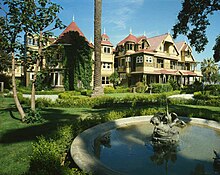Haunted house


A haunted house is a building (or a single room as a haunted room) in which it is supposed to be haunted . The term haunted castle has become established as a variant for castles . The haunted house has found its way into literature, film and video games as a motif.
Examples of supposed haunted houses

Examples of haunted houses:
- Haunted House Hohensyburg , Dortmund , demolished in 2009
- Mansion Villa Oppenheim, Cologne-Fühlingen
- Marienborn Abbey , Burbach
- House Orr , Pulheim
- Scheifenhaus, Obgruiten
- Villa Puth , Blankenstein
- Winchester House
The haunted house as a literary motif
It is a motif from fantastic literature that was particularly popular in the 19th century and was also used again and again later - in films , for example . The preference of many authors for this motif is related on the one hand to its dramatically rich possibilities for variation, on the other hand to the immanent goal of the fantastic, which is quite easy to implement here: the uncertainty of the recipient and the associated feeling of uncanny that arises when reality and Everyday perception is called into question. If the threat emanates from the object that most clearly embodies the security of people, the house or room , the effect is all the more unsettling, even more dramatic.

At the beginning of a typical haunted house story, the protagonists often move into a new house or rent a room - in the film, the viewer usually sees it eerily and threateningly through appropriate camera work and music - only to find out after a while that strange things of different nature are happening . If these can apparently still be explained rationally at the beginning, this hope usually disappears in the course of the action. In the end, the phenomena are often attributed to crimes in the house, which can lead to ending the haunted house ; on the other hand, it is also possible that the residents are forced to leave the house. Authors such as Joseph Sheridan Le Fanu , Ambrose Bierce , HP Lovecraft and Stephen King ( Shining ) each processed the motif in a specific way.
The haunted house as a film motif (examples)
- 1921: The Haunted House with Buster Keaton
- 1927: Spuk im Schloß ( The Cat and the Canary )
- 1959: The house on Haunted Hill
- 1963: Until the Blood Freezes ( The Haunting )
- 1973: Rendezvous for a happy death
- 1977: Hausu ( ハ ウ ス )
- 1980: Shining ( The Shining )
- 1982: Poltergeist
- 1988: Beetlejuice
- 1999: Haunted Hill
- 2002: Rose Red ( Stephen King's Rose Red )
- 2004: The Grudge ( The Grudge )
- 2005: The Skeleton Key ( The Skeleton Key )
- 2006: Monster House
- 2007: The orphanage ( El orfanato )
- 2012: The Woman in Black ( The Woman in Black )
The haunted house as a theme in video games (examples)
- The computer game Maniac Mansion alludes to the theme of the eerie large mansion.
- The computer game series Alone in the Dark and Resident Evil are mainly played in haunted houses and have established the genre of survival horror .
- In the video game Thief: Deadly Shadows the motif of a haunted house appears, the "cradle" is an old abandoned orphanage.
Individual evidence
- ^ Haunted houses in Germany , accessed on October 31, 2014
- ↑ Haunted house and haunted room . In: Rein A. Zondergeld : Lexicon of fantastic literature. Suhrkamp, Frankfurt 1983, ISBN 3-518-37380-3 , p. 295
- ↑ Haunted house and haunted room . In: Rein A. Zondergeld: Lexicon of fantastic literature. Suhrkamp, Frankfurt 1983, ISBN 3-518-37380-3 , p. 295